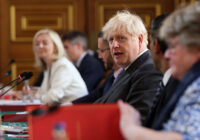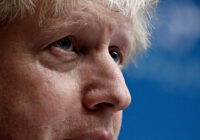When does one person’s freedom contain in its definition the right to cancel another person’s freedom?
As noted in the previous edition of The Daily Devil’s Dictionary, Britain’s chief Donald Trump emulator (and owner of an equally impressive mop of blond hair), Boris Johnson, is under fire for speaking his mind. His remarks about Muslim women wearing the burqa were met by a “wave of anger from senior Conservatives,” led by British Prime Minister Theresa May.
After a first round of calls for an apology, other Tories have now come forward to speak their mind, in defense of Johnson, by invoking the sacred principle of the freedom to speak one’s mind. Iain Duncan Smith reminded those Britons who may have forgotten that “we have a thing called freedom of speech in this country.” Not everyone seemed to be aware that freedom was a “thing.”
Here is today’s 3D definition:
Freedom of speech:
The right of public figures to make outrageous and bigoted pronouncements that clearly disparage entire groups of people on condition that the electoral advantages entailed by their appeal to the bigoted masses will outweigh the inconvenience of criticism by the elite
Contextual note
Another Tory MP, Andrew Rosindell, declared, “What is now happening to Boris Johnson is a direct attack on our freedom of speech.” One can only conclude that in his mind freedom of speech implies not just the protection of the act of provocatively speaking out but, as a corollary, the suppression of other people’s freedom to criticize that act or invoke the consequences of it.
The “our” in “our freedom of speech” should include not only those who think like Rosindell, but also those who take a contradictory position in a public debate. Conservatives are reputed to have a greater respect for strong discipline (right down to caning) than their opponents on the left, except — it appears— when that discipline is applied to their own.
Rosindell should also be aware that, particularly in Britain, freedom of speech is not absolute (far from it), which means it is less a “thing” than Duncan Smith implies. London-based lawyer Mark Stephens explained that, because of the existing laws on defamation in the UK, “you’ve got the rich and powerful shutting down and chilling speech which is critical of them.”
Historical note
The internecine warfare shaking the Conservative Party has already, and quite logically, spilled over into Trumplandia. The Sunday Times informs us that Steve Bannon, once Trump’s right arm (in every sense of the word “right”), has weighed in on the side of Johnson: “The cabinet is at war over Boris Johnson’s burqa furore as President Donald Trump’s former strategist, Steve Bannon, warns the former foreign secretary not to ‘bow at the altar of political correctness’ by apologising.”
In other words, Johnson’s chosen tack corresponds to a strategic choice in a now well-established historical trend of authoritarian populist political movements that appeal to what opportunistic politicians perceive, or wish to believe, is the growing xenophobia of the electorate.
Political incorrectness has become a compulsory component of a populist leader’s profile. Donald Trump has provided us with the current model, which until the emergence of a defiant Johnson, few people believed could be duplicated in the UK. It’s true that Nigel Farage set the tone, but no one seriously believed he could become prime minister. Johnson sees this strategy as the means of taking over his party by guiding it toward an even more simplistic view of the world than its current version embodied by Theresa May and her manifestly stiff upper lip.
Though imported from America, it didn’t start with Trump, who proudly proclaims himself the world heavyweight (wrestling) champion of political incorrectness. In the US, the right has for decades consistently objected to any form of discipline or chastisement against those who use their freedom of speech to foment hate or preach bigotry. “Free speech is an endangered species,” Sarah Palin wrote in 2013, in reaction to the suspension of Duck Dynasty star Phil Robertson after his racist and homophobic comments in an interview. “Those ‘intolerants’ hatin’ and taking on the ‘Duck Dynasty’ patriarch for voicing his personal opinion are taking on all of us.” She was thus exercising her freedom to complain about those who were exercising their freedom to complain.
What Palin didn’t want to admit is that the commercial media who hire people like Robertson have the “freedom” to run their business and manage their public image to ensure their position in the ratings. Even after losing his job, Robertson remained free to think and express himself in public, just as Boris Johnson would be free to rant, even if he was ejected from the Conservative Party. Parties and businesses tend to be intolerant of anything that harms their ratings, profits or hopes for electoral success. The rules of capitalism grant them that particular freedom, which in no ways compromises the personal freedom of individuals with regard to laws protecting freedom of speech.
Citing Palin’s reaction, New York City attorney Brett Joshpe in Politico reminded us that this wasn’t the first time. It’s a pattern, enshrined in political discourse. “Each time a controversy like this occurs—and the list of them is long at this point—it is remarkable how quickly people shout “free speech” when they sympathize with the messenger,” he said.
*[In the age of Oscar Wilde and Mark Twain, another American wit, the journalist Ambrose Bierce, produced a series of satirical definitions of commonly used terms, throwing light on their hidden meanings in real discourse. Bierce eventually collected and published them as a book, The Devil’s Dictionary, in 1911. We have shamelessly appropriated his title in the interest of continuing his wholesome pedagogical effort to enlighten generations of readers of the news.]
The views expressed in this article are the author’s own and do not necessarily reflect Fair Observer’s editorial policy.
Photo Credit: Alexandros Michailidis / Shutterstock.com
Support Fair Observer
We rely on your support for our independence, diversity and quality.
For more than 10 years, Fair Observer has been free, fair and independent. No billionaire owns us, no advertisers control us. We are a reader-supported nonprofit. Unlike many other publications, we keep our content free for readers regardless of where they live or whether they can afford to pay. We have no paywalls and no ads.
In the post-truth era of fake news, echo chambers and filter bubbles, we publish a plurality of perspectives from around the world. Anyone can publish with us, but everyone goes through a rigorous editorial process. So, you get fact-checked, well-reasoned content instead of noise.
We publish 2,500+ voices from 90+ countries. We also conduct education and training programs
on subjects ranging from digital media and journalism to writing and critical thinking. This
doesn’t come cheap. Servers, editors, trainers and web developers cost
money.
Please consider supporting us on a regular basis as a recurring donor or a
sustaining member.
Will you support FO’s journalism?
We rely on your support for our independence, diversity and quality.






